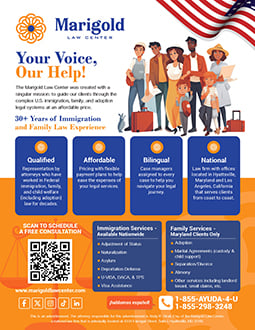Compassionate Immigration Attorneys Helping Victims Secure Humanitarian Visas
Humanitarian visas are available to migrant victims of human trafficking, crime and domestic violence. In many cases, these visas lead to lawful permanent residence in the United States.
If you face any of these dangerous situations, our experienced and empathetic lawyers at Marigold Law Center can help secure your safety and stability. With offices in Hyattsville, Maryland, and Los Angeles, California, we help people nationwide with applications for humanitarian visas and other complex immigration matters.
Victims Of Human Trafficking
Human trafficking is a crime where traffickers attempt to lure people to the United States with false promises of a better life and employment. Migrant victims often fear working with law enforcement because they do not have immigration status in the United States.
Traffickers often use this fear to control and exploit victims. Also, cultural and language barriers make it difficult for migrant victims to seek help.
For these reasons, the United States offers human trafficking victims a protective visa that helps provide a sense of security and safety and stabilizes their status in the United States. This proactive visa also encourages victims to become strong, active participants in detecting, investigating and prosecuting human traffickers.
T nonimmigrant status, or T visa, is for victims severely impacted by human trafficking. Victims can stay and work in the U.S. for up to four years after receiving T nonimmigrant status.
In limited situations, T nonimmigrant status can be extended beyond four years. Victims can also apply for an adjustment of status if they meet certain requirements. To apply for a T visa, an applicant must file a Form I-914, Application for T Nonimmigrant Status.
Victims Of Crimes
U nonimmigrant status is intended for victims of certain crimes. Like the T visa, the purpose of the U visa is to provide certain protections to victims to encourage their participation and cooperation with law enforcement.
Once granted U nonimmigrant status, recipients can remain and work in the U.S. for up to four years. As with the T visa, extensions beyond four years are sometimes granted. Victims can also apply for an adjustment of status if they meet certain requirements.
The following are U visa-qualifying crimes:
- Domestic violence: Physical abuse, mental abuse and verbal abuse
- Obstruction of justice: Perjury, witness tampering and withholding evidence
- Violent crimes: Murder, manslaughter, rape, robbery and stalking
- Sexual crimes: Assault, abuse, prostitution, trafficking and exploitation
- Enslavement crimes: Kidnapping, abduction, hostage, human trafficking, false imprisonment and debt servitude
- Foreign labor fraud
To seek a U visa, applicants must file a Form I-918, Petition for U Nonimmigrant Status.
Additional Information On T And U Visas
To be eligible for both U and T visas, victims must typically agree to work with law enforcement in detecting, investigating and prosecuting human trafficking and other crimes that qualify.
For T visas, some exemptions and exceptions exist where victims are under 18 years old when the victimization occurs or victims suffer psychological or physical trauma.
For U visas, special rules and exceptions exist for victims under 16 years old and victims who are incapacitated or deemed incompetent.
Victims Of Domestic Violence
Under family-based immigration proceedings, U.S. citizens and lawful permanent residents (LPR) file petitions on behalf of migrant family members. However, some petitioners misuse this process to abuse migrant family members further. This happens by threatening to withdraw or withhold petitions to intimidate, control and coerce them.
The Violence Against Women Act (VAWA) allows victims to escape abusive situations without jeopardizing their chances of achieving LPR status. In other words, VAWA applicants can file petitions themselves (self-petition) for immigrant status without the abuser’s consent, knowledge or participation in the immigration process.
The process allows victims to find safety and be independent from their abusers. To seek VAWA, an applicant must file an I-360, Petition for Amerasian, Widow(er), or Special Immigrant.
To qualify for VAWA, male or female applicants must fulfill the following requirements:
- Abusers must be U.S. citizens or LPRs.
- Abusers must be former or current spouses of applicants.
- Applicants must have suffered extreme battery or cruelty.
- The marriage must have been entered into in good faith and not to obtain a green card.
- Applicants must currently live in the U.S. unless the U.S. armed forces or the federal government employs the abuser.
- Applicants must have resided with the abuser before applying.
- The applicant must have good moral character.
If the United States Citizenship and Immigration Services (USCIS) approves the application, VAWA self-petitioners may seek LPR status and obtain a green card. This can be done in two ways. Approved self-petitioners inside the U.S. can apply for an adjustment of status. Approved self-petitioners outside the U.S. can pursue consular processing.
Schedule A Free Consultation To Determine Eligibility For A Humanitarian Visa
Seeking a humanitarian visa is complex and grueling, so we don’t recommend doing it on your own. At Marigold Law Center, our caring and knowledgeable immigration attorneys can guide you through this complicated process. Call us toll free at 323-714-0195 or email us to request a free consultation. We serve people nationwide from our Hyattsville, Maryland, and Los Angeles, California, offices.


